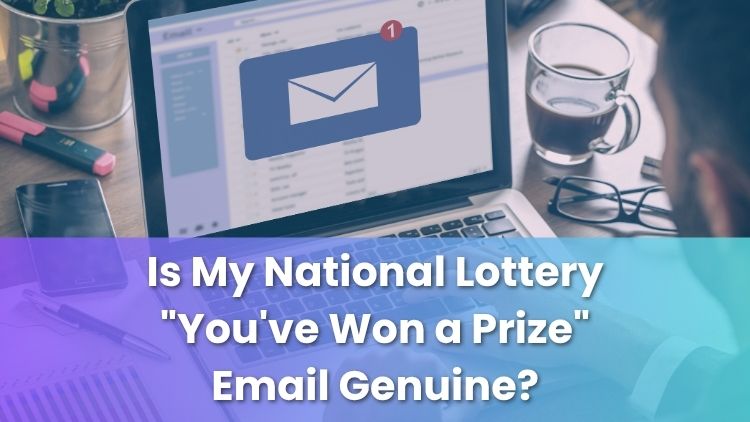
Receiving an unexpected email claiming you’ve won a National Lottery prize can raise questions, especially when it looks official. While some messages may be genuine, others can be misleading—designed to imitate legitimate communications and potentially collect personal information.
Knowing how The National Lottery contacts winners can help you identify genuine notifications and avoid potential scams. Read on to learn more about what to look out for.
How Winners Hear From The National Lottery
The National Lottery gets in touch with online winners by email, always using official addresses ending in “@nationallottery.co.uk”. If you’ve won a prize from the National Lottery, you’ll also find notifications in your personal account when you log in.
With real messages, you are never asked for banking passwords or to pay any fees to receive your prize. Instead, official emails will only ask you to sign in and check your secure account messages.
If you’ve bought a ticket from a shop, it’s up to you to check the results. Retailers can’t contact winners directly, and large shop wins must be claimed by calling The National Lottery’s helpline. What to do next is printed on the back of every ticket.
If any message doesn't seem right, you might want to visit the official website. As explained earlier, secure and official methods are always used to share prize information.
What A Real Win Email Looks Like
Genuine prize emails arrive from an address ending in “@nationallottery.co.uk”, not from unfamiliar or slightly altered addresses.
Typically, these messages don’t include personal details or reveal the amount won. If you’ve won something and receive an email about it, you’ll usually see a simple message about “good news”, suggesting you log in to your account for more information.
You’ll never be asked for sensitive banking information, passwords, or upfront payment. Always check that web links take you to the correct National Lottery website by confirming the address starts with “https://www.nationallottery.co.uk”.
If you’re ever in doubt, don’t reply—go directly to the official website and check for notifications there instead.
How Soon Will I Find Out If I’ve Won?
If you’ve played online, you’d usually receive an email from The National Lottery shortly after the draw, encouraging you to log in and check your account for any updates.
For in-store entries, you’d need to check your ticket yourself. This can be done by visiting a retailer with a National Lottery terminal, scanning the ticket using the official app, or comparing your numbers with the results available online.
If you've won a prize, smaller amounts can often be claimed in-store, while larger wins may need to be claimed by following the instructions provided either on your ticket or through your online account. If you’re unsure of the process, the official National Lottery website offers step-by-step guidance.
If you’re ever uncertain about whether a message or procedure is genuine, it’s best to consult the official support channels for clarification.
How To Claim Lottery Winnings Online
If you receive a win notification, log in to your official National Lottery account, as explained earlier. Smaller prizes are usually credited automatically to your account.
Higher amounts may require you to provide identification or speak to a National Lottery representative. These steps are explained clearly, and you won’t be asked to pay anything upfront. All interactions should remain within the secure site or through their official helpline.
Watch Out For Email Scams
If you receive an email claiming you’ve won a National Lottery prize, it’s important to take a moment to check whether it’s genuine—especially if you don’t recall buying a ticket. Some scam messages are designed to look convincing, often using real logos and similar language to official communications, but their goal is usually to collect your personal or financial information.
Be especially wary of messages that ask for bank details, request a processing fee, or claim you’ve won without entering. These are common signs of a scam. It’s also a good idea to check the sender’s email address carefully—unusual spellings or unfamiliar domain names can be red flags.
If you’re ever unsure, avoid clicking on any links in the message. Instead, go directly to the official National Lottery website, where you can safely check your account or find support.
By knowing what to expect from genuine prize notifications—and how to spot the warning signs of a scam—you can stay more informed when playing.
**The information provided in this blog is intended for educational purposes and should not be construed as betting advice or a guarantee of success. Always gamble responsibly.
